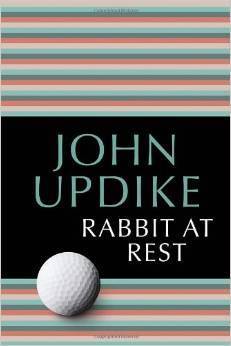What do you think?
Rate this book


Indeed, from Rabbit's vantage point--which alternates between a winter condo in Florida and the ancestral digs in Pennsylvania, not to mention a detour to an intensive care unit--decay is overtaking the entire world. The budget deficit is destroying America, his accountant is dying of AIDS, and a terrorist bomb has just destroyed Pan Am Flight 103 above Lockerbie, Scotland. This last incident, with its rapid transit from life to death, hits Rabbit particularly hard:
Imagine sitting there in your seat being lulled by the hum of the big Rolls-Royce engines and the stewardesses bring the clinking drinks caddy... and then with a roar and giant ripping noise and scattered screams this whole cozy world dropping away and nothing under you but black space and your chest squeezed by the terrible unbreathable cold, that cold you can scarcely believe is there but that you sometimes actually feel still packed into the suitcases, stored in the unpressurized hold, when you unpack your clothes, the dirty underwear and beach towels with the merciless chill of death from outer space still in them.Marching through the decades, John Updike's first three Rabbit novels--Rabbit, Run (1960), Rabbit Redux (1971), and Rabbit Is Rich (1981)--dissect middle-class America in all its dysfunctional glory. Rabbit at Rest (1990), the final installment and winner of the Pulitzer Prize, continues this brilliant dissection. Yet it also develops Rabbit's character more fully as he grapples with an uncertain future and the consequences of his past. At one point, for example, he's taken his granddaughter Judy for a sailing expedition when his first heart attack strikes. Rabbit gamely navigates the tiny craft to shore--and then, lying on the beach, feels a paradoxical relief at having both saved his beloved Judy and meeting his own death. (He doesn't, not yet.) Meanwhile, this all-American dad feels responsible for his son's full-blown drug addiction but incapable of helping him. (Ironically, it's Rabbit's wife Janice, the "poor dumb mutt," who marches Nelson into rehab.)
His misplaced sense of responsibility--plus his crude sexual urges and racial slurs--can make Rabbit seems less than lovable. Still, there's something utterly heroic about his character. When the end comes, after all, it's the Angstrom family that refuses to accept the reality of Rabbit's mortality. Only Updike's irreplaceable mouthpiece rises to the occasion, delivering a stoical, one-word valediction: "Enough." --Rob McDonald
608 pages, Paperback
First published December 18, 1990
“You dumb bitch,” he says. He hits her not in the face but on the shoulder, like a man trying to knock open a stuck door. Harry feels a flash of pleasure: sunlight in a tunnel. He hits her three, four, five times, unable to stop, boring his way to that sunlight, not as hard as he can hit, but hard enough for her to whimper; she doubles over so that his last punches are thrown hammerwise down into her neck and back, an angle he doesn’t see her from that much — the chalk-white parting, the candle-white nape, the bra strap showing through the fabric of the back of the blouse. Her sobbing arises muffled and, astonished by a beauty in her abasement, by a face that shines through her reduction to this craven faceless posture…he half-pummels her sides…
The inside of the Corolla is warming with a mingled human smell. Harry thinks of the girl’s long thigh as she stretched her way into the back seat and imagines he smells vanilla. Cunt would be a good flavor of ice cream, Sealtest ought to work on it.
Oblong cocooned little visitor, the baby shows her profile blindly in the shuddering flashes of color jerking from the Sony, the tiny stitchless seam of the closed eyelid aslant, lips bubbled forward beneath the whorled nose as if in delicate disdain, she knows she’s good. You can feel the curve of the cranium she’s feminine, that shows from the first day. Through all this, she has pushed to be here in his lap, his hands a real presence hardly weighing anything but alive. Fortune’s hostage, heart’s desire, a granddaughter. His. Another nail in his coffin. His.
I cannot greatly care what critics say of my work; if it is good, it will come to the surface in a generation or two and float, and, if not, it will sink, having in the meantime provided me with a living, the opportunities of leisure, and a craftsman’s intimate satisfactions.
–Conversations
The day is still golden outside, old gold now in Harry’s lengthening life. He has seen summer come and go until its fading is one in his heart with its coming, though he cannot yet name the weeds that flower each in its turn through the season, or the insects that also in ordained sequence appear, eat, and perish.